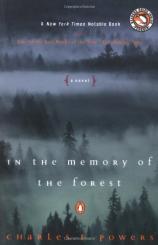Reading Group Guide
Discussion Questions
In The Memory of the Forest

1. Leszek is troubled by something his father told him: "History is like a force behind us, pushing us along, unacknowledged or even unknown, but dictating the way we live our lives" (p. 13). Why is Leszek disturbed by this attitude toward history? Why does he perceive his father's comments as a "warning"?
2. The forest is central to many of the story's themes, and represents different things for different characters. Discuss the impact of the forest on the lives of Leszek, Powierza, Leszek's grandfather, Czarnek, Father Tadeusz, and other characters. Also, discuss the imagery a forest invokes.
3. Although Jola and Leszek aren't very far apart in age, they seem to represent different generations. Why is this? Why would Jola choose to leave town with Karol rather than stay with Leszek?
4. Discuss the relationship between the two priests, Father Tadeusz and Father Jerzy. What do these two men have in common? How do they each go about pursuing their responsibilities to their congregation?
5. Many characters in the novel—Father Tadeusz, Father Jerzy, Leszek's grandfather, Czarnek, and Powierza—are attempting to correct the injustices of the past. Compare their personal struggles, and the different kinds of history they represent.
6. In his distillery, Czarnek ruminates on the process that converts grain into alcohol—a cycle of breakdown and decay that produces a product called a spirit, but that is also poisonous. Is Powers making an analogy to the collapse of Communism? Which do you think triumphs in this story—decay or growth?
7.What role does Andrzej, the plumber, play in the town? Father Tadeusz describes him as "ubiquitous," and, indeed, he plays a part in each of the novel's many stories. What does he represent to the novel, and to the structure of the town itself?
8. Compare the impact of Communism and of the Catholic Church in the town of Jadowia. How are these two institutions similar with regard to their structures, their history, and their leaders? Which, if either, is more powerful?
9. Why do you think it is so hard for the people of Jadowia to accept and remember what happened to the Jews in their town? Do you think Czarnek's and Leszek's grandfathers' tributes to the past will help them come to terms with that part of their town's history?
10. Has capitalism been a good thing for the people of Jadowia, or do you think they were better off before the defeat of Communism? Before the Nazi invasion? How have the forces of history affected the town?
11. What has this novel taught you about the history of Poland? How has it changed your impressions of the country and its people?
In The Memory of the Forest
- Publication Date: May 1, 1998
- Paperback: 384 pages
- Publisher: Penguin (Non-Classics)
- ISBN-10: 014027281X
- ISBN-13: 9780140272819






